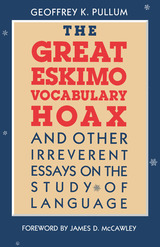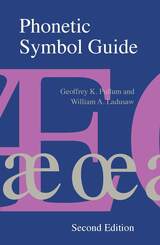
Generalized Phrase Structure Grammar provides the definitive exposition of the theory of grammar originally proposed by Gerald Gazdar and developed during half a dozen years' work with his colleagues Ewan Klein, Geoffrey Pullum, and Ivan Sag. This long-awaited book contains both detailed specifications of the theory and extensive illustrations of its power to describe large parts of English grammar. Experts who wish to evaluate the theory and students learning GPSP for the first time will find this book an invaluable guide.
The initial chapters lay out the theoretical machinery of GPSP in a readily intelligible way. Combining informal discussion with precise formalization, the authors describe all major aspects of their grammatical system, including a complete theory of syntactic features, phrase structure rules, meta rules, and feature instantiation principles. The book then shows just what a GPSP analysis of English syntax can accomplish. Topics include the internal structure of phrases, unbounded dependency constructions of many varieties, and coordinate conjunction—a construction long considered the sticking point for phrase structure approaches to syntax.
The book concludes with a well developed proposal for a model theoretic semantic system to go along with GPSP syntax. Throughout, the authors maintain the highest standards of explicitness and rigor in developing and assessing their grammatical system. Their aim is to provide the best possible test of the hypothesis that syntactic description can be accomplished in a single-level system. And more generally, it is their intention to formulate a grammatical framework in which linguistic universals follow directly from the form of the system and therefore require no explicit statement. Their book sets new methodological standards for work in generative grammar while presenting a grammatical system of extraordinary scope.

Geoffrey K. Pullum's writings began as columns in Natural Language and Linguistic Theory in 1983. For six years, in almost every issue, under the banner "TOPIC. . .COMMENT," he published a captivating mélange of commentary, criticism, satire, whimsy, and fiction. Those columns are reproduced here—almost exactly as his friends and colleagues originally warned him not to publish them—along with new material including a foreword by James D. McCawley, a prologue, and a new introduction to each of these clever pieces. Whether making a sneak attack on some sacred cow, delivering a tongue-in-cheek protest against current standards, or supplying a caustic review of some recent development, Pullum remains in touch with serious concerns about language and society. At the same time, he reminds the reader not to take linguistics too seriously all of the time.
Pullum will take you on an excursion into the wild and untamed fringes of linguistics. Among the unusual encounters in store are a conversation between Star Trek's Commander Spock and three real earth linguists, the strange tale of the author's imprisonment for embezzling funds from the Campaign for Typographical Freedom, a harrowing account of a day in the research life of four unhappy grammarians, and the true story of how a monograph on syntax was suppressed because the examples were judged to be libelous. You will also find a volley of humorous broadsides aimed at dishonest attributional practices, meddlesome copy editors, mathematical incompetence, and "cracker-barrel philosophy of science." These learned and witty pieces will delight anyone who is fascinated by the quirks of language and linguists.

This fully revised second edition incorporates the major revisions to the International Phonetic Alphabet made in 1989 and 1993. Also covered are the American tradition of transcription stemming from the anthropological school of Franz Boas; the Bloch/Smith/Trager style of transcription; the symbols used by dialectologists of the English language; usages of specialists such as Slavicists, Indologists, Sinologists, and Africanists; and the transcription proposals found in all major textbooks of phonetics.
With sixty-one new entries, an expanded glossary of phonetic terms, added symbol charts, and a full index, this book will be an indispensable reference guide for students and professionals in linguistics, phonetics, anthropology, philology, modern language study, and speech science.
READERS
Browse our collection.
PUBLISHERS
See BiblioVault's publisher services.
STUDENT SERVICES
Files for college accessibility offices.
UChicago Accessibility Resources
home | accessibility | search | about | contact us
BiblioVault ® 2001 - 2024
The University of Chicago Press









